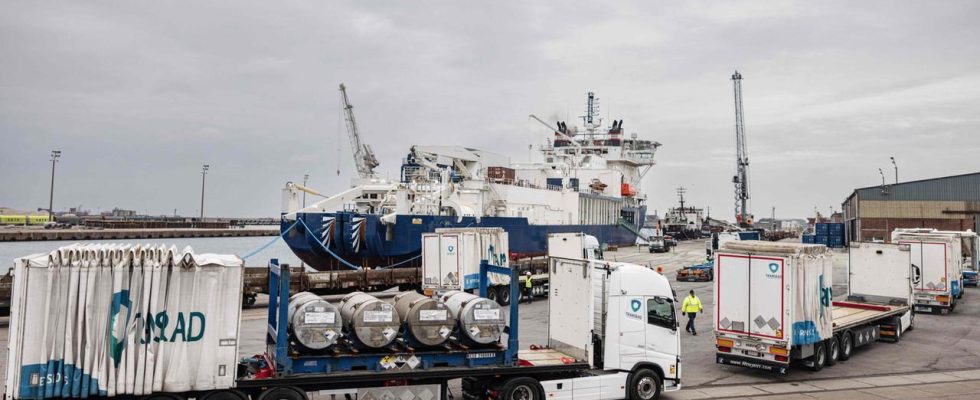background
Uranium from Russia is not yet part of the EU sanctions packages. Germany would like to change that, France is slowing down. Because such trade restrictions would hit an entire branch of industry badly.
The site on the edge of the large gray production halls of Tricastin, a nuclear power plant north of Avignon, is still a desolate wasteland. But in a few years, new uranium enrichment plants are supposed to be here.
A total of four additional modules are to be built here, explains engineer Christophe Mei, who is leading the project. His boss, Francois Lurin, director of the nuclear technology group Orano, sees great demand for uranium enriched in France.
The investment in Tricastin responds to the needs of customers worldwide: “They want to become less dependent on uranium enriched in Russia. Especially the USA. And we want to provide an answer to this demand.”
The extent of the dependency remains unclear
This investment is also useful for French nuclear power production. The country purchases enriched and natural uranium from Russia. To what extent, even experts cannot say. Yves Marignac is an expert on nuclear energy at the think tank négaWatt, which is critical of nuclear power. Opposite of ARD he explains this information gap by saying that the nuclear industry refuses to release figures:
There is a law of silence on the part of the government and the nuclear industry. France is always claimed not to be dependent on Russia, but asking for numbers doesn’t give us the information we need to gauge the extent of the dependency.
Uranium is already being enriched in the Georges Besse II plant – in a few years further capacities are to be created at the Tricastin nuclear power plant
The minister reassured
But there are indications: The European nuclear authority Euratom reports that in 2021 almost 20 percent of the natural uranium delivered to the EU came from Russia. There are also 23 percent from Uzbekistan and 25 percent from Kazakhstan – both countries that Russia is trying to influence.
Agnes Pannier-Runacher, France’s energy transition minister, does not deny that Russia supplies France. But speaking to the Economics Committee of the French Parliament last September, she stressed:
When it comes to our dependence on Russia, let me remind you that we source natural uranium from very different countries and that we are technically capable of enriching uranium ourselves.
In an interview with the “Frankfurter Allgemeine Zeitung” in March, she also assured that it would have “no impact whatsoever” on the operation of the nuclear reactors if the contracts with Russia expired tomorrow.
More collaborations
There are still close ties with the Russian state-owned company Rosatom, for example in turbine construction. The French group GEAST also and mainly produces its turbines for Rosatom, one of the largest exporters of nuclear reactors in the world. Nuclear energy expert Marignac criticizes this:
Not only does France depend on the dynamism of Russia’s nuclear industry to keep its own turbine plant profitable, but it also indirectly promotes Russia’s geopolitical strategy. Because Moscow secures its influence in other countries by exporting and operating reactors.
Joint venture with impact
And in France, according to the state-dominated nuclear power producer EDF, almost 2,400 jobs depend on turbine production. The French state actually wanted to give the Russian company Rosatom a 20 percent stake in the capital of the turbine manufacturer GEAST. But the war put that plan on hold. When asked, EDF said: This participation is currently not up to date.
On the other hand, cooperation in the manufacture of fuel elements is very topical. The EDF power plant division Framatome has established a joint venture with Rosatom, with a 25 percent Russian stake. In Germany, in Lingen, Lower Saxony, of all places, the two companies want to produce fuel rods for Russian-type reactors – if the federal government should give the go-ahead after all.
The publisher of the World Nuclear Industry Status Report, Mycle Schneider, points out that there are 19 Russian-design reactors in the European Union that are operated with such fuel elements. In addition, there would theoretically be 15 reactors in the Ukraine that are operated with such fuel elements. This is the result of a market analysis.
Even more dependency?
So a joint venture that makes sense, in order to be able to produce fuel elements of Russian design in the EU in the near future and thus be able to cover the requirements in Eastern Europe ourselves? Nuclear power critic Marignac warns: With this cooperation, Framatome is not reducing its dependence on Rosatom, but on the contrary: Framatome is allowing the Russian group to penetrate even deeper into the French nuclear industry. It is ethically necessary to sever all bridges with Rosatom.
A request from ARD at Framatome initially remained unanswered. But the fuel assembly joint venture is entirely in line with an agreement Framatome and Rosatom only signed in December 2021. It says that they want to cooperate “strategically” and “long-term”.

